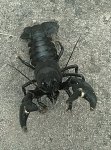adwuk
Active member
A very rare seahorse has been filmed somewhere around Plymouth. I am guessing Cawsand, but they don't disclose exactly where.
‘Really, really rare’ seahorse spotted off UK coast
‘Really, really rare’ seahorse spotted off UK coast

